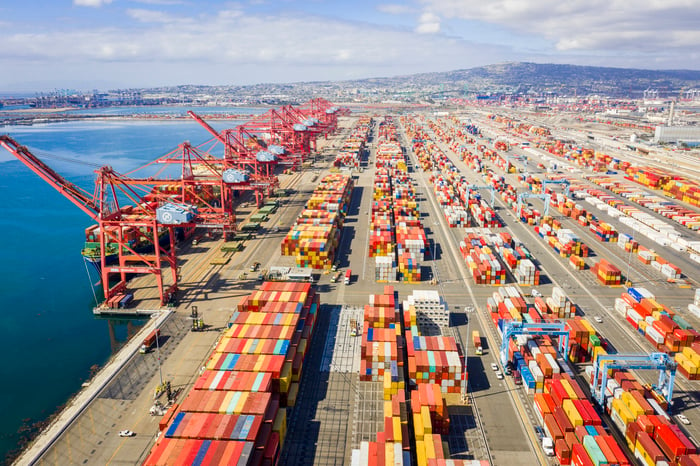When even the White House no longer sugarcoats the supply chain crisis and warns "there will be things that people can't get" for Christmas, you know the situation is going from bad to worse.
The congestion and bottlenecks at the busiest ports are so severe that some of the biggest retailers are chartering their own ships to bring in their merchandise from overseas, despite pricing for charters being at record levels.

Image source: Getty Images.
Most of the retailers are reserving ships for relatively short periods, seemingly just trying to get through the Christmas season, but Dollar Tree (DLTR -0.57%) seems to think the problem may be much worse, as it has entered into shipping contracts until 2024.
Although some analysts say that move unnecessarily ties the discounter to high-cost charters well beyond when the situation should have eased, president and CEO Mike Witynski told analysts it believes its regular carriers will be able to fulfill only 60% to 65% of their commitments.
So is the deep discounter onto something, and are the others due to find themselves in the same situation in the future? Or is this a transitory issue that will sort itself out in due course? There's good reason to believe the dollar-store chain may be right.

Image source: Getty Images.
Trying an end run around the bottlenecks
The Port of Los Angeles is the world's largest port, some 43 miles long and 8,000 acres in size. Last year it moved more than 9.3 million twenty-foot equivalent units, that being roughly the size of a typical intermodal container. About half a million containers are currently waiting to be offloaded from cargo ships at the port.
Flareups of coronavirus in Asia have disrupted the supply chain as new lockdowns are imposed, but retailers can't wait. From Costco (COST -0.12%) and Home Depot (HD -0.31%) to Party City (PRTY -60.00%) and Walmart (WMT 0.57%), major retailers are attempting to ensure distribution centers and stores are fully stocked with merchandise for the holiday season by contracting for their own container ships. IKEA is even buying its own containers.
Where the typical container ship can hold around 20,000 containers, the ships the retailers are getting are much smaller, carrying only around 1,000 containers, though they are usually about twice as expensive to charter.
According to industry site Freightos, the global container freight index rose from $2,232 last year to almost $10,000 this year while the index for the China/East Asia route to North America's west coast went from $3,847 in 2020 to over $16,000 today. While prices have eased in recent days, rates remain extraordinarily inflated.

Image source: Getty Images.
A monster truck jam
Yet shipping is only part of the problem. For the containers to be offloaded, a conga line of trucks must be ready to take the goods from port to locations across the country. Some 73% of all goods are transported by truck, but the nation is also caught in the grip of a truck driver shortage that threatens the nation's supply chain as well.
This is a separate crisis that has been building for years. The American Trucking Association warned in 2018 there was a shortage of 51,000 drivers, and that shortage only worsened after the pandemic struck. The ATA now predicts the industry will need 174,000 truck drivers by 2026.
Trucking giant Old Dominion Freight Line (ODFL 0.82%) recently held a job fair where it said it was willing to hire new long-haul drivers, regardless of whether they had experience or not. Trucking companies offering hiring bonuses of as much as $20,000 are not uncommon.
The ripple effect will continue hurting supply chains across the country and across all industries. Retailers are hoping that by chartering their own ships they'll be able to bypass the congested ports and offload their goods at less busy ones, but they still might encounter logjams because of the driver shortage and end up creating backlogs elsewhere.
The New York Times says 80,000 containers are now waiting to be moved out of the Port of Savannah in Georgia, some 50% more than usual. It calculates that about 13% of "the world's cargo shipping capacity is tied up by delays."
No easy way out
Analysts are optimistic the traffic jam at the ports can be cleared up by late 2022 or early 2023, but the deepening trucking crisis could very well extend the logjam even further.
It may be costing Dollar Tree more to lock in these high rates for what seems like such a long time, but the discount chain may be the most prudent retailer to lock in today's charter rate. Consumers, though, may be the ones most disappointed after they see just how barren store shelves become.





